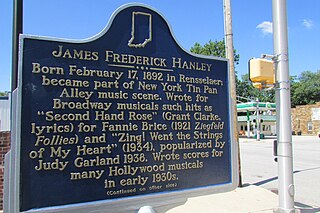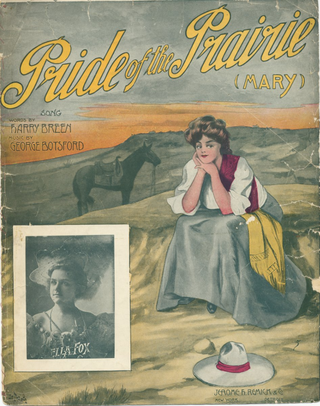This is a list of notable events in music that took place in the year 1908.

Charles Luckyth Roberts, better known as Luckey Roberts, was an American composer and stride pianist who worked in the jazz, ragtime, and blues styles. Roberts performed as musician, band/orchestra conductor, and dancer. He taught music and dance. He also owned a restaurant and bar in New York City and in Washington, D.C. Luckey Roberts noted compositions include "Junk Man Rag", "Moonlight Cocktail", "Pork and Beans" (1913), and "Railroad Blues".

William Denight Cobb was an American lyricist and composer. He and a partner, Ren Shields, produced several popular musicals and musical comedies in the early 20th century. Cobb also had a long-run collaboration with Gus Edwards.
"Illinois" is the regional anthem of the U.S. state of Illinois. Written in about 1890 by Civil War veteran Charles H. Chamberlin (1891–1894), the verses were set to the tune of "Baby Mine," a popular song composed in 1876 by Archibald Johnston. "Illinois" became the state song by an act of the 54th Illinois General Assembly in 1925.

"On the Banks of the Wabash, Far Away" was among the best-selling songs of the 19th century, earning over $100,000 from sheet-music revenues. Written and composed by American songwriter Paul Dresser, it was published by the Tin Pan Alley firm of Howley, Haviland and Company in October 1897. The lyrics of the ballad reminisce about life near Dresser's childhood home by the Wabash River in Indiana, United States. The song remained popular for decades, and the Indiana General Assembly adopted it as the official state song on March 14, 1913. The song was the basis for a 1923 film of the same title. Its longtime popularity led to the emergence of several lyrical versions, including an 1898 anti-war song and a Swedish version that was a number-one hit.

J. Fred. Helf was an American composer and sheet music publisher during the early 20th century.
"Fare Thee Well" is an 18th-century English folk ballad, listed as number 422 in the Roud Folk Song Index. In the song, a lover bids farewell before setting off on a journey, and the lyrics include a dialogue between the lovers.

Theodore F. Morse was an American composer of popular songs.

The Fabulous Dorseys is a 1947 American musical biopic film directed by Alfred E. Green. It tells the story of the brothers Tommy and Jimmy Dorsey, from their boyhood in Shenandoah, Pennsylvania through their rise, their breakup, and their personal reunion. The film was also released under the alternative title The Fighting Dorseys.

"The World Is Waiting for the Sunrise" is a post-World War I popular song with lyrics by American actor Eugene Lockhart, and music composed by Canadian-born concert pianist Ernest Seitz in 1918. He later claimed he conceived the refrain when he was 12 years-old. Embarrassed about writing popular music, Seitz used the pseudonym "Raymond Roberts" when the song was published on January 24, 1919, by Chappell & Co. Ltd., London, UK.

The Smithsonian Collection of Classic Country Music was a multi-volume set of recordings released by the Smithsonian Institution. Released in 1981, the collection contains 143 tracks deemed to be significantly important to the history of country music.

Charles N. Daniels, was a composer, occasional lyricist, and music publishing executive. He employed many pseudonyms, including Neil Moret, Jules Lemare, L'Albert, Paul Bertrand, Julian Strauss, and Sidney Carter. His creative work is generally credited as "Moret" while his business dealings and ASCAP membership were under the name Daniels.

James Frederick Hanley was an American songwriter and author.
"Polly Vaughn" is an Irish folk-song.

"Pride Of The Prairie" is a popular song written in 1907 with music by George Botsford and lyrics by Henry J. Breen. The lyrics tell of a cowboy's love for Mary, the "Pride of the Prairie".

"Golden Arrow" is a popular song published both as an intermezzo two-step and a ballad in 1909. The music was composed by Egbert Van Alstyne, with lyrics added by Harry Williams. The ballad is a love story between the unnamed son of a Chief Arrow-Bow and a maiden named Golden Arrow, both of the Sioux nation in Idaho.
George William Meyer was an American Tin Pan Alley songwriter. He was born in Boston, Massachusetts, in 1884. He graduated from Roxbury High School, and began working in accountancy for Boston department stores, before moving to New York City in his mid-20s.
Harry David Kerr was an American songwriter, lyricist, author, and lawyer. Kerr became active in music at age 15 (1895). The practice of law had been his prime avocation until 1920, when he decided to focus on songwriting. But he still continued to use his legal training in music. In 1922, while living in New York City, Kerr prepared the incorporation documents for the American Society of Composers, Authors and Publishers (ASCAP), of which he had become one of 90 charter members at its founding in 1914.
Grace Leboy Kahn was an American composer.

Tom Lemonier was an actor and composer of popular music during the ragtime era, particularly active in Black Vaudeville. His work featured in various musicals. Some of his work was published by the Gotham-Attucks Music Publishing Company.













